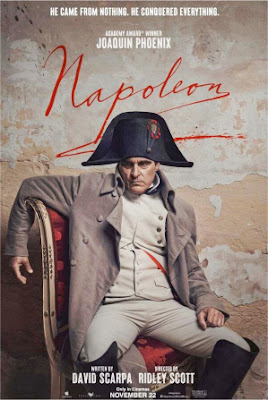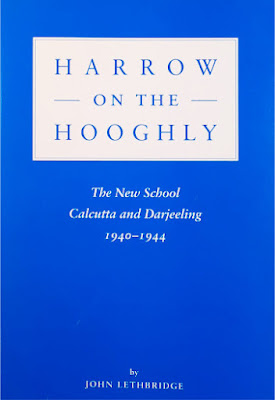Napoleon
Watching Napoleon has left me feeling a little sad. It's also left me feeling violently shaken, but more about that later.
As it says on the poster, this is a Ridley Scott film. I can't claim to have seen all of his films, but I have seen many of them, in the cinema, and the fact that he was the director was usually the main reason I went and parted with cash, to see a film on the big screen. I'm certainly drawn to science fiction, so Alien and Blade Runner are the films of his which figure most prominently in my mind. But I've enjoyed his work in many other genres as well, Thelma and Louise and Gladiator and so many more. I'd barely heard about Scott before I saw his first film, The Duellists (who are Keith Carradine and Harvey Keitel), which made a big impression with its spectacle and its rendering of its almost Shakespearean theme. Interestingly, it also has the Napoleonic Wars as its background.
I got to wondering how many times I'd seen Napoleon Bonaparte in the cinema: it's actually quite a few. Off the top of my head, he was there in Waterloo, in the person of Rod Steiger, up against Christopher Plummer. Another no less memorable appearance for me was in Time Bandits, represented brilliantly and sympathetically by Ian Holm. In Napoleon, he is Joaquin Phoenix, an actor who's impressed me several times, not least in Ridley Scott's Gladiator. But I found his performance here weird, detached and almost disinterested; I never found him convincing as the charismatic leader Napoleon surely was, and couldn't understand his desultory love making in a context not that common amongst the contemporary elite, of actually being passionate about his wife. This approach to the part must have been deliberate by both him and the director, so I don't know what to think.
We gather the French really don't like the film. However, their main complaint is that it's "historically inaccurate". This is a laughable complaint, history is generally too messy to render and explain clearly in 2/3 hours on film without some 'tidying up'. And with a life as complex and important as Napoleon's, it's impossible. But the French are bound to feel that they 'own' the story of Napoleon, and one has a bit of sympathy for their feeling resentful at foreigners attempting to tell it.
Some time ago I was a member of a club devoted to French culture, and we did have a couple of bona fide French members. One of them was a fierce supporter of Napoleon and in due course gave us a lecture designed to underline his historical importance. She said virtually nothing about his military campaigns. What she revealed, which I knew very little about, was his legacy in the government and legal systems of nations right across Europe, a legacy which continues today. This film doesn't concern itself with any of that. Should it? Maybe not in any detail, but by avoiding it altogether, in the end, I felt it had made Napoleon seem an almost trivial figure.
The film's core is Napoleon's relationship with Josephine. How true to history the film is, no one can really know, but we probably do know more of the intimate details than with most famous couples. If this is it, we have a Napoleon who continues to love his wife throughout despite her wandering fancy. Josephine, played by Vanessa Kirby, I found much more believable, but I admit I'm a fan of the actress. The story does dwell on her failure to produce an heir, and also the poignancy of her death, though it's off screen and Napoleon hears about it from her daughter (adult daughter - the aging process is a bit vague for the main characters in this film). Finally there's her spectral voiceover as he awaits death on St Helena.
So, I'm sad. It's not great as a historical biopic, and film wise the story and script don't really come together. But it is a Ridley Scott film, and it's spectacular, lavish sets and battle scenes and all. Honestly, despite all my misgivings, you don't take your eyes off the screen for a moment.
I did also say I was thoroughly shaken up by the film. That's because this was my initiation into 'sensurround' or what ever you want to call it ('4DX'); seats which worked somewhat like a flight simulator, lots of shaking, blasts of air past your ears, and even splashes of water drops (as if there hadn't been enough torrential rain on the way to the cinema). Naturally this was working overtime during the battle scenes, and any time a horse turned up. There were many, many horses in this film. You began to speculate about what you were going to be treated to when Napoleon and Josephine expressed their passion, but the shaking was disappointingly absent then. Perhaps that was its own comment on the famous love affair.
But this is one director who really doesn't need any extra assistance with action scenes to prompt your imagination. 4DX was an amusing novelty, but I don't think it'll become an essential part of my future cinema experiences. Though I'll likely still go back for Scott's next film.




Comments
Post a Comment